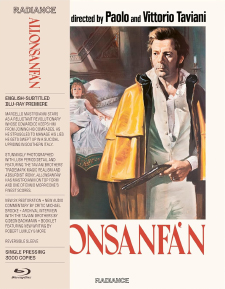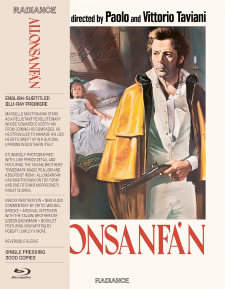Allonsanfàn (Blu-ray Review)

Director
Paolo Taviani, Vittorio TavianiRelease Date(s)
1974 (February 27, 2024)Studio(s)
Una Cooperativa Cinematografica (Radiance Films)- Film/Program Grade: B
- Video Grade: A-
- Audio Grade: A-
- Extras Grade: A-
Review
Sometimes films good, bad, or indifferent just fail to connect with the viewer. That was true for me with Allonsanfàn (1974), an Italian historical drama by brothers Paolo and Vittorio Taviani, the team behind Padre Padrone (1977) and The Night of the Shooting Stars (1982). Stylistically somewhere between Visconti’s The Leopard (1963) and Kubrick’s Barry Lyndon (1975), the film stars Marcello Mastroianni as an aging, disillusioned aristocrat-turned-revolutionary in early 19th Italy during the Restoration.
Fulvio Imbriani (Mastroianni) is a prominent member of the underground revolutionary group known as the Sublime Brothers. The film opens with Fulvio released from prison, his captors having spread rumors that he had sold out the Grand Master, but who, in fact, has already committed suicide. The Brothers temporarily disband, and Fulvio returns home to his family villa, nursed back to health by his family.
He’s ready to chuck his ideals and return permanently to the family fold, but then Charlotte (Lea Massari), his former lover and fellow revolutionary, returns from abroad where she’s raised enough money to liberate the Kingdom of the Two Sicilies, torn apart by a cholera epidemic. For his part, Fulvio would rather reconnect with their son, Massimiliano, hidden away for years with peasants, so that the three of them could emigrate to America. When Charlotte informs him that the Brothers, disguised as hunters, will reunite at the villa, his sister, Esther (the always interesting Laura Betti), informs local soldiers who ambush the band, killing most of them, while Fulvio and a wounded Charlotte manage to flee to safety. The bulk of the film has wishy-washy Fulvio furtively planning to abscond with the money and start a new life, but fate ironically keeps drawing him back into the Brothers’ doomed mission.
Unquestionably, Allonsanfàn is handsomely mounted, with isolated scenes of great beauty and accompanied by a fine Ennio Morricone score (later appropriated by Quentin Tarantino for use in Inglourious Basterds) but, for me, it all just sits there, stillborn. Not long ago I watched Alain Resnais’s The War is Over (La Guerre est finie, 1966), which tells a virtually identical story with Yves Montand playing a similarly disillusioned Spanish communist in 1960s France and, in every way, I found that film and character far more credible, involving, and interesting. Despite Mastroianni’s effective melancholy gazes at nothing in particular, I never believed in Fulvio as a once-passionate idealist facing an existential crisis the way Montand’s believably does. Instead, he comes off weak, unsympathetic and at times even annoying.
My limited knowledge of early 19th century Italian history didn’t help. Why, for instance, are the soldiers ambushing the Brothers at the villa Austrian? The film also apparently draws allusions to present-day (i.e., 1970s) Italian political disorder following the May 1968 protests and rise in domestic terrorism, also largely lost on this viewer.
There are numerous stand-alone vignettes that impress. One scene, for instance, has Fulvio treating his much-loved son to dinner at a restaurant, where aristocratic patrons can’t help but notice this father’s love for his boy, prompting a restaurant-wide toasting of the boy. Mostly, though, the film plays like a humorless, even grim George MacDonald Fraser novel.
Radiance Film’s Blu-ray of Allonsanfàn is presented in its original 1.66:1 widescreen theatrical ratio via a 2K restoration by Surf Film and Istituto Luce Cinecittà. The image is mostly very strong, with only opticals exhibiting excessive grain. The uncompressed LPCM 2.0 mono is above average, and the optional English subtitles of this Italian-only release are excellent. The disc is Region “A” and “B” encoded.
Supplements consist of a new audio commentary by critic Michael Brooke; a 57-minute 1966 audio interview by critic Gideon Bachmann that includes Paolo Taviani and other Italian filmmakers discuss the role of directors; a subtitled Italian trailer; and a 28-page full-color booklet featuring a new essay by Robert Lumley and a 1975 interview with the Taviani brothers by Andrée Tournés.
Take a gander at IMDb user reviews of Allonsanfàn and your find widely diverse opinions—some hate it, others regard it as a masterpiece of cinema. I found it interesting and effective in some ways but never connected with the film as much as I would have liked.
- Stuart Galbraith IV

